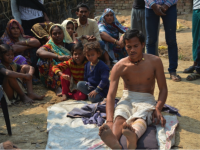On the 18th of March 2017, the Gurgaon Additional Sessions Court convicted 13 Maruti Suzuki workers to life imprisonment for the killing of a manager on 18 July, 2012. 117 workers who already spent four years in jail were acquitted earlier while another 14 were given a three year sentence though they too were in jail for four years. 148 workers were in jail for four years having been denied bail since 2012. Of the 13 sentenced to life 12 are body members of the workers union and Jiyalal, a worker who was attacked by a supervisor and abused on the basis of caste that day of the incident, is the 13th worker. The court pronounced this judgement without enough evidence and appears to have been influenced by the management of this Japanese company and the prevailing anti-worker attitudes of the state administration. This wholly baseless judgement against the Maruti workers cannot but evoke condemnation.
The whole case is made out on the basis of the incident that occurred on 18th July, 2012 in which the HR manager Avanish Dev lost his life. The FIR filed by the police contained between 500 to 600 unnamed accused and the company terminated the services of 546 workers for the violence on that day. What was striking was that even before any investigation was done the entire blame was put on the workers by the police and the administration as was done by the management. Thus the police thereby ruled out the hand of the management in the entire incident. Discrepancies in the managements version apart, there were bouncers that day and many workers were injured but the police targeted only the workers and that too on the basis of the list provided by the management. It is a well known fact that the Haryana police has always been siding with the management ever since the first signs of struggle by the workers in 2000 while after the incident on 18th July the role of police became more brazen. Workers have been at the receiving end facing state repression. Many were subjected to third degree methods,workers and even terminated workers were regularly harassed by the police apart from the massive police deployment. These methods were obviously aimed at pleasing the corporates and create an atmosphere of fear among the workers aimed at stifling the right to organize and unionise. It was a kind of warning to the entire working class of the industrial areas of Gurgaon and Manesar, though at a different level we witnessed the same in Honda, Nippon, Graziano. More than hundred workers of the Regency Ceramics located geographically in AP but a part of far off Puduchery have to regularly travel to Puduchery to attend the cases in which they are implicated like the Maruti case.
The workers of Maruti have a long history of struggle against inhuman working conditions, work pressure, victimization since the inception of the company as a PSU in 1981 to the present under the Japanese MNC. “Make in India” has been happening in varying degrees in the country for a long time with foreign capital ruling the roost and is further intensified under the present regime. Economic policies are so framed that they cater to the needs of foreign and corporate capital and run counter to the interests of the working class. Contractualisation of labour is an essential ingredient of these policies that capital demands. Privatization of profit making PSUs has also been one important feature in these policies while normal trade union rights of the workers are, in practice, suspended leading to situations like the one witnessed in Maruti. Even the normal right to get the union registered was sought to be suppressed with the active collusion of the labour department. It took one whole year to get the union registered in 2012 and there are many such examples in the country like in the Aurobindo Pharma in AP. From a wholly owned state undertaking to a wholly owned private company, Maruti stands as an example of continuous resistance of the workers, often at the receiving end for asserting their democratic rights. Their fight against the contract labour system and the unity of regular and contract workers stand as examples in the struggle to defend basic rights. The recent judgement imposing life imprisonment on 13 workers and other sentences need to be opposed tooth and nail and as a mark of solidarity with the Maruti workers struggle, National Committee of IFTU calls upon the workers at large to join the protest programmes to be held on April 4th or 5th throughout the country.
